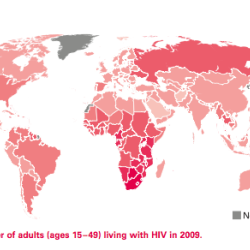Source Institutions
Source Institutions
Add to list Go to activity
Activity link broken? See if it's at the internet archive

In this activity, learners act as epidemiologists by mapping the prevalence of HIV/AIDS worldwide. Learners discover that many countries with high HIV infection rates have low levels of per capita income and education, two characteristics often linked with disease.
- 10 to 30 minutes
- 1 to 2 hours
- $1 - $5 per group of students
- Ages 8 - 18
- Activity, Lesson/Lesson Plan
- English
Quick Guide
Materials List (per group of students)
- Set of Adult HIV/AIDS Prevalence Rate, by Country Tables sheets (pg.7-11 of PDF)
- Large political world map mounted in a central location or find and download a world map from the Internet using the search terms, “world,” “map,” and “countries.” Enlarge the map to poster-size so that smaller countries, especially in Europe, can be identified.
- Map pins or push pins (or small colored stick-on dots) in six colors
- Internet access to geography websites or a current world atlas
- Fine point ballpoint pen with which to score cardstock before folding (felt- or gel-tipped pens are not appropriate)
- Copies of Where in the World and enlarged copies of black world map (pg.5-6 of PDF)
Subjects
-
Life Sciences
-
Diversity of Life
- Viruses and Bacteria
-
Ecology
- Populations
-
Human Body
- Health and Nutrition
- Immune System
-
Diversity of Life
-
Mathematics
-
Data Analysis and Probability
- Data Analysis
- Data Representation
-
Measurement
- Rate
-
Data Analysis and Probability
-
The Nature of Science
- Science as a Career
Audience
To use this activity, learners need to:
- see
- see color
- touch
Learning styles supported:
- Involves teamwork and communication skills
- Links STEM to other topics of interest such as arts and humanities
- Uses STEM to solve real-world problems
- Involves hands-on or lab activities
Other
Components that are part of this resource:
Includes alignment to state and/or national standards:
This resource is part of:
Access Rights:
- Free access
By:
- Vogt, Ed.D., Gregory L. ; Moreno, Ph.D., Nancy P.
Rights:
- All rights reserved, Baylor College of Medicine, 2011
Funding Source:
- Science Education Partnership Award from the National Center for Research Resources (NCRR) of the National Institutes of Health (NIH), 5R25 RR018605
